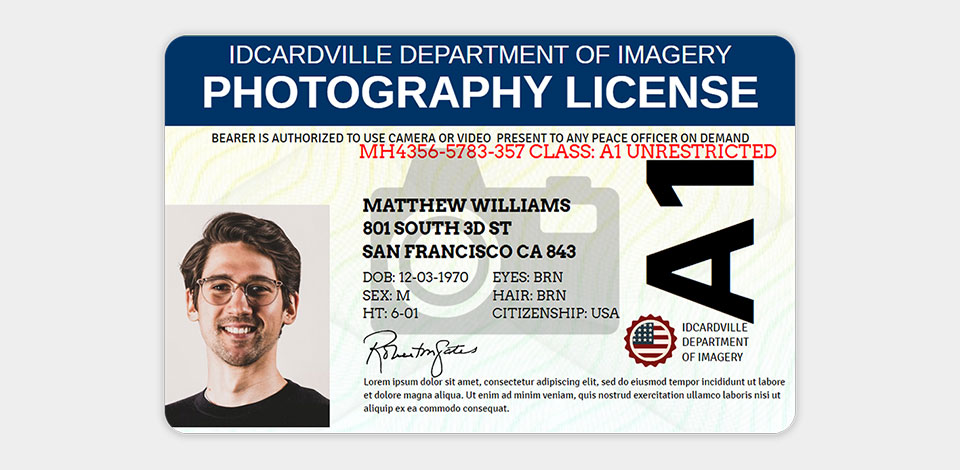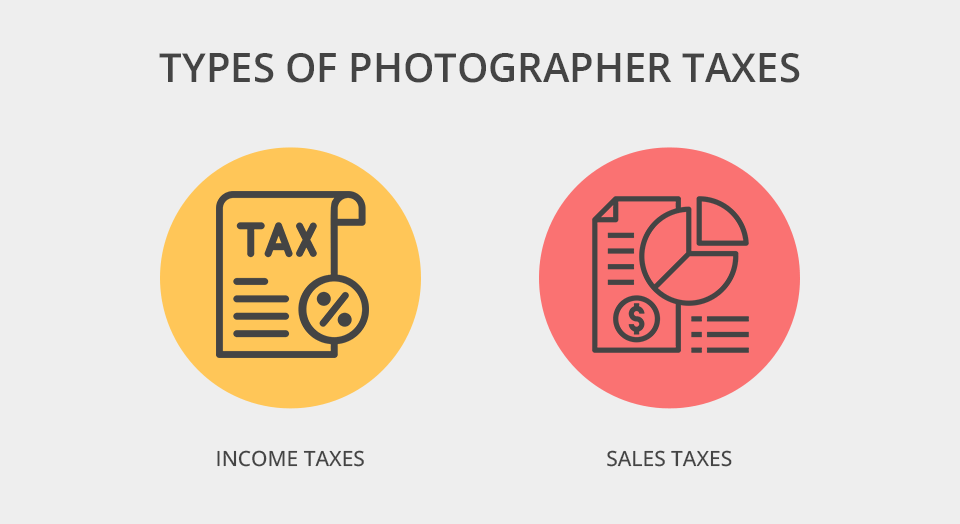
If you are serious about providing photography services in your area, you have already asked yourself about a photography license. Majority of the US authorities don’t require the professional license in order to run or operate a photography business, but there are cities that need this document. Make two phone calls to your state licensing board and local city hall to find it out and make your business official.

As a rule, the local governments require a license for photography of a certain type. Even if a photographer is going to open a photography studio, he/she needs to get a special permit. You don’t need to spend a lot of money and time to obtain such a license in most states/cities.
Of course, the laws in all cities are different It depends on where you live. For example, in Michigan, photographers can offer their services without getting a photography license. However, if you live in California, you need several licenses to run a business. Typically, the list includes a business tax certificate, occupational safety and health, as well as a registration form for employers as a part of industry certification.
You need to make two calls to get information about business licenses for photography and their types. First, you need to call the state licensing board, and then address the local city hall. You will spend only a couple of minutes on both calls and will get the necessary information. Please note that only those who want to become professional photographer, and are going to make a living in such a way, need these documents.
First of all, you need to get a photography license agreement to ensure a good financial condition of your company. Providers, employees, state/local governments, and customers should know that your business is completely legal. The business license for photography ensures that your business is absolutely legitimate and you can be trusted. In addition, it allows the photographer to apply for an annual tax return confirming the legitimacy of the business.
To be legally protected is the second reason why you need to have a photography license. Unfortunately, most photographers neglect this rule. In addition, if you have no license, you can be fined by any form of the government. A caveat to keep in mind is that a photography business that operates without a license is more subject to penalties from local authorities.
Besides, clients are likely to choose a licensed photographer rather than a shooter who can’t confirm that his/her services comply with established standards. The absence of legal permission to run a business can also cause much doubt. So, if you want to prevent such issues, you should stick to regulations.
As we have said, the photography license requirements are different in all cities and states, so you need to be careful and attentive. Negligence at this stage won’t allow you to how to start a photography business with no money. As a rule, the procedure of obtaining a license includes following steps.
First of all, when learning how to get photography license, you need to determine the structure of your future company. The most common type of photography business structure is a proprietorship. It is very easy to register and manage compared to analogs. You can start with this form to understand the pitfalls of doing a photography business. Over time, when your team expands, you may switch to LLC or S corporation.
Sometimes, the choice of photography business names is one of the main problems for photographers. As the statistics show, most of them choose their name and add the word “Photography”. This is the fastest and easiest way, but you be creative and invent the name, which will attract the attention of customers. Make sure that there are no other companies with the same name.
This is a very important step because you need to get a license in a city where you’re planning to run your business. The license will be given only for your real business address. After you’ve decided on your residential area, you should learn about the procedure of getting a photography business license in that location. There are probably official websites where all details are covered. However, you may need to get several licenses if you live in one place but perform photo sessions in adjacent cities.

Follow these easy steps to find out what types of licenses are valid in your country:
Similar to applying for other types of legal documents, you have to deal with some paperwork when requesting a license. The process involves filling out various forms. You can do this online. You can download these forms from your local government sites or take them at your City Hall.

You can print these forms, fill them in and scan or fill in the online version. Some states make provisions for performing these functions directly online (but first, you’ll have to create an account). You will need to specify the following information:
Any businessman can fill in the forms on the official website of his/her city. As a rule, such sites usually have all the necessary data.
Starting a business you need to pay a registration fee (the sum varies in different cities). In general, you will pay from $50 to 400. This charge varies according to your business type. You may also pay $25 for additional processing.
As you understand, no one knows how long your request will be processed. As a rule, experts review the online application within 2 weeks. After that, the photographer will receive an email that contains a nine-digit UBI number with the printed Business License.

The insurance isn’t a pressing issue for a legal business and I doubt that some states request photographers to be insured. However, it could be rather a wise business decision. No one knows what may occur (your photography gear can be damaged or you may face photography copyright.
There are different companies offering photography insurance and the cost of such services may vary. So, it is recommended to compare the rates before making a choice. Another aspect to consider is the options covered by a license. You can start with basic coverage and later purchase additional options based on your business requirements. There are 4 insurance policies to cover the majority of photographers’ potential issues.
Let’s imagine that you have spent all your money on the camera stuff but, eventually, the purchased camera body, the lens or the laptop is damaged or has been stolen. So your business may suffer greatly. This type of photography insurance will cover your expenses as well as to get your camera or its accessories repaired.
Having got the Liability Insurance, you are protected against third parties claims for injuries. As an example, your tripod may fall and hurt somebody. Or someone could trip over your cord. This is the evident reason to file a lawsuit against you.
Seasoned photographers know that liability lawsuits can spike serious financial problems, so it’s better to do all possible to prevent them. With general liability insurance, you can be sure your legal fees, as well as expenses on possible injured clients, vendors, and other third parties, are covered.
This type of insurance gives you peace of mind about all your business-owned structures – studios and offices, furniture, and fixtures. This may also refer to your equipment if you add the “contents-only” mark to the document. Photographers owning or renting any building even a tiny one should definitely apply for such a license.
Everybody makes mistakes. It may happen that you have spoiled all the wedding pictures accidentally. Or your customers do not like the finished images and refuse to take them, demanding the prepayment back.
Even a professional photographer can find himself/herself in such a situation, dealing with difficult clients. The above-mentioned photography business insurance covers the conditions when the mistake was on the part of a photographer and resulted in financial losses. But with the insurance, you are legally protected.
As the name implies, such a photography business insurance is used for “protecting” business-owned and private vehicles. It includes:
If you use a personal car for business needs, you are underinsured unless you have commercial auto coverage.

If you decide to get the photography license, you shouldn’t forget about the taxes, which you will have to pay according to the legal standards. According to your location and state legislation, as well as your photography business plan peculiarities, you may have quite different taxes. The taxes differ in accordance with the government level. Mainly there are sales taxes and income taxes.
Sales taxes are imposed on the sale of the private property or particular products provided. You have to pay an income tax on the income you get as a photographer. The federal and state administrative institutions regulate it.
In every jurisdiction in America, photographers are obliged to pay sales taxes if the state has them in effect. Though photographers think that their work can be described as services, most authorities perceive them as a product no matter whether they deliver physical or digital photos.
States collect sales taxes with the help of a corresponding license known as a sales tax certificate. The whole process takes no more than 5 minutes. You can learn more details about a particular state by entering the name of the state in Google and typing “get sales tax number”.